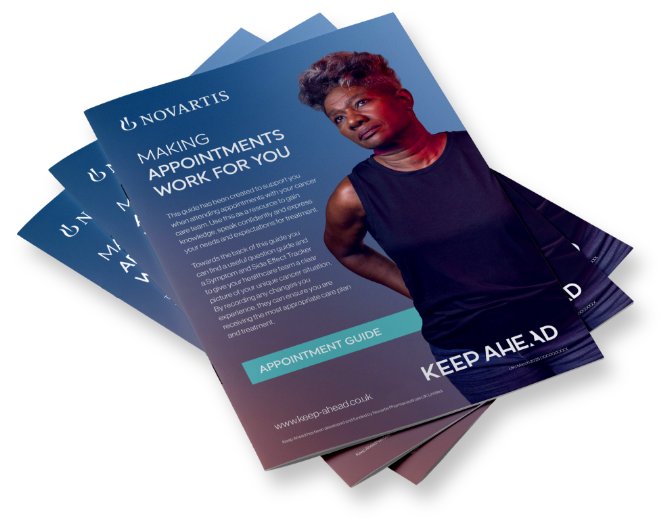Diagnosed and living with breast cancer
Living with breast cancer can feel overwhelming, but understanding your condition and finding ways to manage the challenges can make a big difference to your emotional and mental wellbeing.
It looks like you are using an older version of Internet Explorer which is not supported. We advise that you update your browser to the latest version of Microsoft Edge, or consider using other browsers such as Chrome, Firefox or Safari.
Keep Ahead has been developed and funded by Novartis Pharmaceuticals UK Limited. This site is intended for UK early breast cancer patients and general public.
Living with breast cancer can feel overwhelming, but understanding your condition and finding ways to manage the challenges can make a big difference to your emotional and mental wellbeing.
Early breast cancer is a term used to describe breast cancer that is small and found only in the breast tissue, or in lymph nodes close to the breast.1 In many cases, early breast cancer may be highly treatable and survivable,2 and the goal of treatment is to remove or control the cancer before it spreads.1 This is why it is so important to catch the cancer at the earliest stage possible.
While it’s encouraging to know that many people successfully manage early breast cancer, we understand that every person’s breast cancer journey comes with emotional and physical challenges.

Navigating life with breast cancer can be scary and maybe even frustrating at times, but there are people you can speak to if you are struggling.
Here are a few ideas that may help you improve your quality of life.




Limiting alcohol consumption to one or fewer drinks per day reduces the risk of a second primary breast cancer.3

Whether it’s family, friends, or a support group, staying connected to loved ones can help you feel less isolated.

Practices like mindfulness, meditation, or even your hobbies can help to calm times of stress.

Don’t hesitate to ask your medical team about anything from side effects to emotional support services. They are there to help guide you through this journey.
While breast cancer treatments are often effective, it’s important to keep in mind that it’s important to keep in mind that having a conversation about the risk of recurrence with your doctor can help you identify steps to minimise the chances of cancer coming back.4
Your personal risk of recurrence is an important factor to consider when selecting a breast cancer treatment plan. Talk to your healthcare professional early to explore your options and make informed decisions based on your individual risk profile.
Regular follow-ups, monitoring, and open conversations with your doctor are key to catching any potential issues early. Staying aware of your body and letting your care team know about any red flag symptoms of recurrence allows for early medical intervention if necessary.

If you’re undergoing treatment for breast cancer, like chemotherapy, hormone (endocrine) therapy or ovarian suppression, you might experience menopausal symptoms. Some women find these symptoms manageable, although it is perfectly normal if you find them difficult to cope with. Sometimes it can affect your quality of life, stopping you from doing the things you enjoy. Speak to your care team if you are struggling to manage.5
Below are some common menopausal symptoms:

Hot flushes

Night sweats

Changes to how you experience orgasm

Vaginal dryness

A crawling sensation under the skin

Changes to sex drive

Heart palpitations

Joint pain

Changes to skin and hair

Weight gain, particularly around the waist

Difficulty sleeping

Memory and concentration problems

Feeling anxious or irritable

Mood changes

Many women have concerns about whether they can still get pregnant, especially when they are young, and their treatment has brought on early menopause. This can be emotionally challenging, especially if you’re hoping to start a family or have more children.5
Even if your periods have stopped and you’re experiencing menopausal symptoms, you may still be fertile and capable of becoming pregnant. During menopause, fertility can persist, as your ovaries may still be partially functioning.5
If you have questions about how breast cancer treatment may impact menopause, how you can manage your menopause symptoms, or need any further information about your fertility and menopause status, your healthcare team can provide guidance specific to your situation.5

Being diagnosed with early breast cancer is life-changing, and sharing this news with friends, family, and even your workplace can be a significant step in building your support system to help you in your ongoing journey.
You don’t have to share everything at once, nor do you have to speak about it straight away. Some people take time to process their news and share their feelings only when they feel ready. It can be helpful to explain that your treatment might affect your quality of life, so take the time to figure out a way to bring this up and what you want from it before you initiate the conversation.
Important things to consider:
When you do find the right time to speak about it, you could let your friends and/or family know that you would like their support, whether that is in the form of attending appointments with you, researching breast cancer with you, or giving you some time alone. There are many ways to approach this conversation, and everybody does it differently. Ultimately it comes down to you as an individual, so take the time to figure out how to have the conversation which best suits you.
If you feel overwhelmed by the amount of people are reaching out, don’t be afraid to set boundaries, or have a close friend or relative speak for you if you don’t want to.

When sharing the news at work, consider speaking to your manager or HR about your diagnosis. If you’re not comfortable getting into the specifics, you could try explaining that you may have medical appointments or need flexibility so they can accommodate your needs and provide a supportive environment while undergoing treatment.
Letting people know you might not be your usual self
Early breast cancer treatment often brings physical and emotional changes which may impact your energy and focus. If you feel comfortable with it, you can share your experiences with close colleagues or team members. Even letting them know that your treatment and its side effects might lead to days where you are quieter or less focused than usual. This can help to foster a more compassionate and comfortable work environment.

Under the Equality Act from 2010, you’re not required to tell anyone about your diagnosis at work, but our recommendation is to tell your employer since you are protected under the law. If you choose not to tell them, they will not know how best to support you. The following may help when you have that discussion with your employer:
These changes might impact my development and stop me progressing in my career
Here in the UK, it is discriminatory to treat anyone differently in terms of promotion or pay because they have cancer. That is a right from the first day of your employment and you are protected forever. If you are experiencing discriminatory treatment due to your diagnosis, get advice from ‘Working With Cancer’ or other cancer support organisations. You should also speak to your HR team to support you during this time.
Where can I find out more?
Working With cancer
References:
UK | February 2025 | FA-11295688

Terms of use | Cookies and Data Privacy | Cookie Settings
Keep Ahead has been developed and funded by Novartis Pharmaceuticals UK Limited. It has been created in collaboration with primary breast cancer patients whose knowledge and insights have informed the content and direction for the campaign.
This website is part of a programme that is funded by Novartis Pharmaceuticals UK Limited. Novartis Pharmaceuticals UK Limited is a private limited liability company registered in England and Wales under number 119006. Registered office 2nd Floor, The WestWorks Building, White City Place, 195 Wood Lane, London, W12 7FQ. Use of this website is governed by our Terms of Use and the Cookies and Privacy Policy.
Reporting side-effects
If you get side effects with any medication you are taking, talk to your doctor, pharmacist or nurse. This includes any possible side effects not listed in the information leaflet that comes in the pack. You can report side effects via the Yellow Card Scheme at www.mhra.gov.uk/yellowcard. By reporting side effects, you can help provide more information on the safety of your medication.
© 2025 Novartis Pharmaceuticals UK Ltd - UK | May 2025 | FA-11340321-1. This site is intended for a UK early breast cancer patients and general public.
